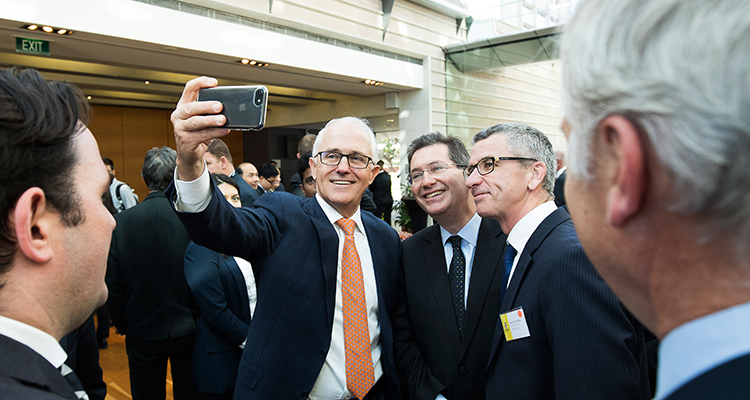
International education is more than foreign students coming to study in Australia and then leaving with a degree, Prime Minister Malcolm Turnbull said at UNSW Sydney.
Prime Minister Malcolm Turnbull placed international education at the forefront of Australia’s foreign policy and emphasised its role in the security and prosperity of the Indo-Pacific region during a speech at UNSW Sydney on Tuesday.
Mr Turnbull spoke to an audience including the Chinese ambassador to Australia, Cheng Jingye, and the Chinese consul general, Gu Xiaojie, as well as representatives from the Group of Eight and Universities Australia. He said that universities play a vital role in connecting regional partners and bringing the world together.
“International education is so much more than foreign students coming to study in Australia and leaving with a degree,” said Mr Turnbull. “Every arrival here is the start of a relationship that grows, adapts, renews and ultimately benefits us all.”
Australia’s international education relationships began in 1950 when the Menzies government established the Colombo Plan, which delivered regional security and prosperity though development and training. UNSW was the first Australian university to welcome students under the scheme. Today, the New Colombo Plan boosts knowledge of the Indo-Pacific region in Australia by supporting Australian undergraduates to study and undertake internships in the region.
“We have always done best as a nation, economically and socially, when we have been opened to the world,” said Mr Turnbull. “And the Indo-Pacific has done best when Australia has fully engaged and committed to our shared prosperity and security.”
During his speech, Mr Turnbull highlighted the groundbreaking work of several UNSW academics of Chinese heritage, including civil and environmental engineer Dr Jing Guan, chief scientist at Beijing OriginWater Technology Co, one China’s largest water treatment membrane technology companies; and materials engineer Professor Sean Li, whose work in graphene-enhanced electricity transmission lines is revolutionising China’s energy sector.
“Modern Australia is unimaginable without the talented and dynamic contributions of Australians of Chinese descent,” said Mr Turnbull. “They are a vital thread in the fabric of Australian society, the most successful multicultural society in the world.”
The Prime Minister also called attention to the work of UNSW Scientia professors Martin Green and Michelle Simmons. This year, Professor Green became the first Australian to win the prestigious Global Energy Prize for revolutionising the efficiency and cost of solar photovoltaics, while Professor Simmons was named 2018 Australian of the Year in recognition of her pioneering research and inspiring leadership in quantum computing.
International education is a $30.8 billion export industry in Australia – the country’s third-largest export industry and the single-largest services export industry. In 2016, an estimated 130,000 fulltime jobs were supported by international education, with the benefits felt throughout the economy from retail to health care.
“Our universities have played a key role in the story of Australia’s engagement and integration in the region, responding to the challenges and opportunities of these exciting times,” said Mr Turnbull. “I know in doing so, you will play an even greater role in our future.”
- Log in to post comments
